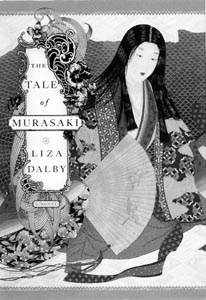![[MetroActive Books]](/gifs/books468.gif)
[ Books Index | Sonoma County | MetroActive Central | Archives ]
Novel Idea
'The Tale of Murasaki' re-creates
the life of the world's first novelist
By Patrick Sullivan
"MANY PEOPLE have this experience when they're a teenager," says author Liza Dalby. "You read a great deal, and then you find something that just blows you away, and you truly realize the power of literature to put you in a completely ºdifferent world. For me that happened in reading the classic Arthur Waley translation of The Tale of Genji."
What Dalby doesn't add is that most of us eventually put our mind-blowing literary discovery aside, with only subtle consequences on the rest of our lives. For Dalby, it was different. Her father's gift to her at age 16 of The Tale of Genji--possibly the world's first novel--helped trigger a lifelong interest in all things Japanese.
Dalby went on to become a trained anthropologist specializing in Japanese culture. As research for her Ph.D., she went so far as to actually
become a geisha--the only Westerner ever to do so. Dalby was a consultant on Arthur Golden's Memoirs of a Geisha, and she'll do the same job on Steven Spielberg's upcoming film adaptation of the bestselling novel.
But the author, now 49, never forgot her experience with The Tale of Genji. Nor did she forget Lady Murasaki Shikibu, who wrote the epic novel in the 11th century, beating Cervantes' Don Quixote by about 600 years.
"She was a prodigious talent," says Dalby, speaking by phone from her home in Berkeley. "The initial impetus for me was just wondering how she could have done this, invented this genre single-handedly. . . . I think it's something of a miracle."
For 10 years, Dalby worked to craft a literary tribute to Murasaki, who is a revered household name in Japan but less well known in the United States. In a project Dalby calls "literary archaeology," she used the existing fragments of Murasaki's diary to create a novelistic reconstruction of the woman's life. The result is the newly published The Tale of Murasaki (Doubleday; $24.95).
Moving at a measured pace, the book employs rich descriptions to bring Murasaki and her aristocratic society to life. The daughter of a well-educated government official, Murasaki led an unusual life for a Japanese woman of her time. Determined to retain her independence, she married late and quickly found herself a widow. A talented poet and dedicated journal writer, Murasaki invented Prince Genji as an antidote to loneliness.
Her hero was a complex figure: a sensitive lover whose exploits thrilled everyone who picked up Murasaki's writing. The stories became wildly popular, eventually capturing the imagination of the regent of the Imperial Court, who appointed the author to tutor his daughter.
Of course, the sources Dalby draws on to create The Tale of Murasaki are fragmentary. The gaps are filled in by her knowledge of Japanese culture and her imagination.
"The diary that she left is like a bright spotlight shining on about three or four years of her life while she was at court," Dalby says. "We don't know a lot about the rest of her life, so my version of the end of her life is conjecture."
Better supported by the facts, Dalby says, is her book's portrayal of Murasaki's intimate relationships with various women. Not only was the world's first novelist a Japanese woman, but Dalby--joined by other scholars--contends that she was also bisexual, a conclusion based on Murasaki's love poems to female friends. "It would be kind of weird, given those poems, to say that she didn't have those kind of relationships," Dalby says.
No one seems upset by such assertions, even the Japanese, to whom Murasaki is a kind of literary goddess. The book will soon be published there, and other foreign language rights are selling like hotcakes. Indeed, it's not impossible that The Tale of Murasaki may ignite the kind of popular interest in Prince Genji and his creator that Arthur Golden's novel did for the world of the geisha. And, to hear Dalby tell it, anyone who does pick up The Tale of Genji will not be disappointed.
"I think what's so appealing about [the book] is that it's set in a world ruled by aesthetics, where poetry matters," Dalby says. "Sensitivity to beauty was the most important thing about a person."
[ Sonoma County | MetroActive Central | Archives ]
Copyright © Metro Publishing Inc. Maintained by Boulevards New Media.
![]()

Liza Dalby speaks on Friday, June 9, at 7:30 p.m. at Readers' Books, 130 E. Napa St., Sonoma. For details, call 939-1779.
From the June 8-14, 2000 issue of the Sonoma County Independent.